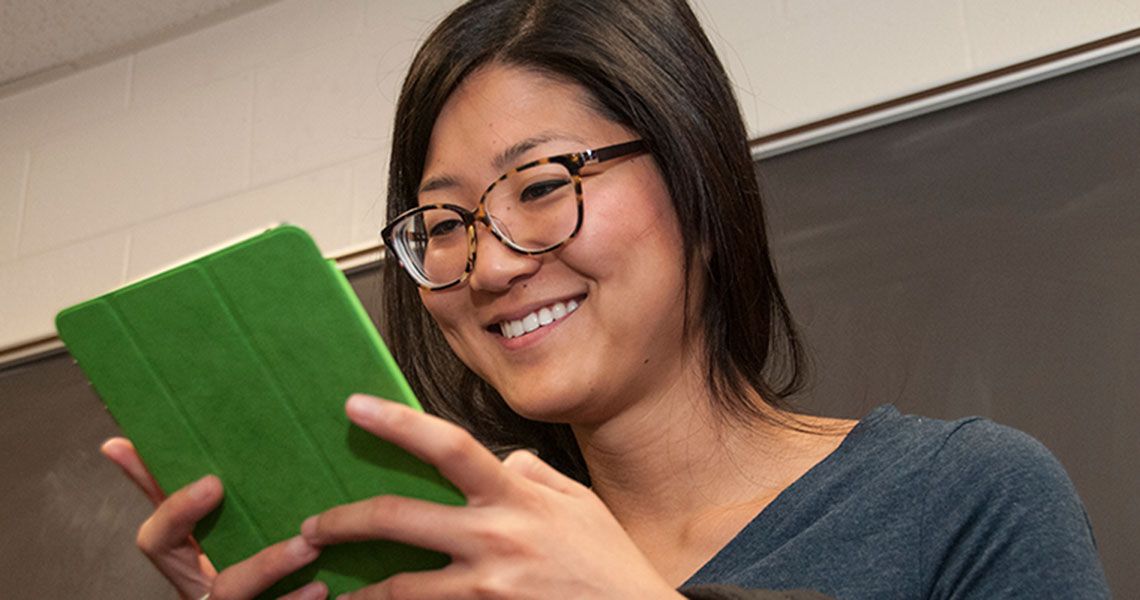Tablet computing has become commonplace in today’s health care arena, allowing physicians to access electronic medical records and information on the Internet from their patients’ bedsides. In the fall of 2014, the GW School of Medicine and Health Sciences (SMHS) took a significant step in the move toward a paperless curriculum while also improving the accessibility of its program materials by making tablets an integral part of the SMHS community. In conjunction with the launch of the revised M.D. program curriculum, the school distributed iPads to all of the incoming first-year medical students. Soon after iPad minis were issued to second-year medical students, and starting this summer students in the Physician Assistant (PA) program will receive iPads of their own.
A faculty committee reviewed different tablets on the market to identify the most appropriate platform, and gave careful consideration to cost, ease of use, available software specific to medical education, and standardization of devices for faculty and students. The recommendation of integrating iPads into the new curriculum by top faculty and clinical physician-educators is a powerful endorsement of this initiative’s potential.
Matthew L. Mintz, M.D. ’94, RESD ’97, assistant dean for curriculum and associate professor of medicine at SMHS, is a driving force behind the iPad initiative. He believes this technology gives students a powerful tool, thus improving the level of care they provide. “We have been thinking about use of electronic devices either iPads or laptops for some time. Launching the iPad initiative simultaneously with the launch of the revised curriculum was the “ideal marriage” of a new curriculum and a new technology to support it,” said Mintz. All course materials are now available through Blackboard using the iPads and students can annotate materials to assist in their studies. In addition, examinations are now taken entirely on iPads.
“The more comfortable students become using those tools, I think the better their ability to function as physicians in the 21st century is going to be,” added Katherine Kennedy, Ph.D., a professor of pharmacology and physiology at SMHS, who was among 30 faculty members who receives iPads and began experimenting with them in the classroom during the fall 2013 semester.
In preparation for the move to iPads in the curriculum, the Office of Medical Education led a series of faculty development workshops for implementing technology. Faculty members have started creating iBooks, which students can access on their iPads. iBook can include embedded videos and quizzes, an advantage over traditional books. In terms of portability, faculty members have also used their iPads as remote presenters, allowing them to move about the room while simultaneously controlling the podium computer.
The iPads are used to track attendance, serve as “clickers” for audience response systems and help students work collaboratively in small groups by use of shared documents accessible on their devices. The devices also replace computers for viewing slides in the histology and pathology courses. Additionally, iPad applications allow students to easily access medical databases, full-text journals from Himmelfarb Library's online collections, and clinical tools such as medical calculators and medication references that can help them during the Clinical Apprenticeship Program.
Looking forward, PA faculty members have been equipped with iPads to promote faculty development and allow for the transformation of teaching and learning, while promoting more self-directed learning on the part of students. Faculty members in the M.D. program will use iPads to investigate applications in the clinical environment including accessing electronic medical records in the hospital and outpatient clinic, deliver distance learning content, and electronic portfolios to track educational progress.



